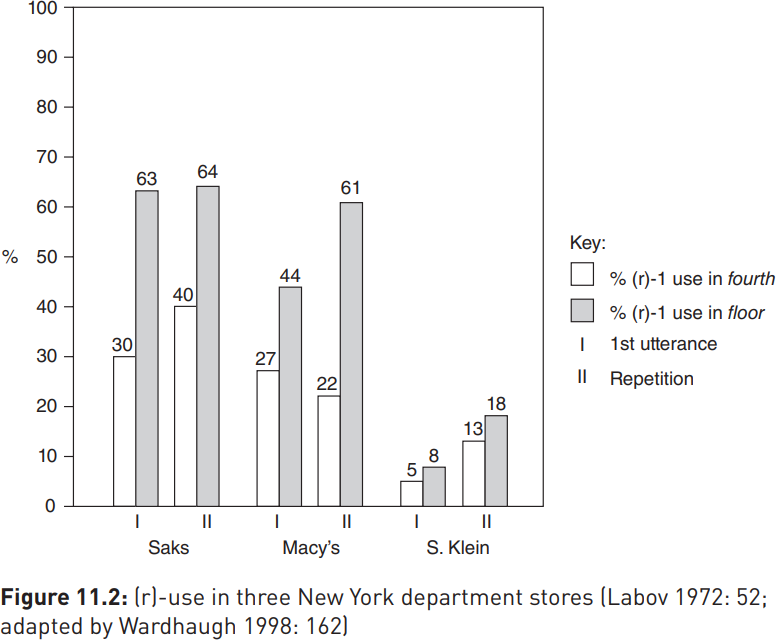
Rapid anonymous observation
 المؤلف:
David Hornsby
المؤلف:
David Hornsby
 المصدر:
Linguistics A complete introduction
المصدر:
Linguistics A complete introduction
 الجزء والصفحة:
227-11
الجزء والصفحة:
227-11
 2024-01-01
2024-01-01
 1261
1261
Rapid anonymous observation
Ingenious techniques such as rapid anonymous observation were used in early variationist studies to overcome the Observer’s Paradox, i.e. the problem of obtaining ‘natural speech’ from informants who know they are under investigation. Sociolinguists have now largely abandoned the notion of ‘natural speech’, on the grounds that all speech is designed with an audience in mind.
The results, when collated and analyzed, showed a remarkable correlation between the status of the store and linguistic behavior, with most use of the prestigious (r)-1 variants occurring, in both environments, in the high-status Saks store and fewest in the lowest-status store, Klein’s. (r)-1 use increased consistently in the repeated ‘emphatic’ style, suggesting that speakers use more prestige variants when paying more attention to their speech.

Labov’s technique of rapid anonymous observation had overcome the Observer’s Paradox and demonstrated a clear, quantifiable correlation between speech and social status. A question we need to ask here, though, is ‘whose social status?’. For all its advantages, rapid anonymous observation yields very little information about informants themselves, beyond that which can be reasonably guessed, for example sex and approximate age. We therefore know little about the shop assistants’ own socio-economic status but, perhaps surprisingly, there is little reason to suppose that it actually corresponded to that of the stores where they worked: indeed, on one criterion, that of pay level, Macy’s rather than Saks employees were believed to be of highest status. In all likelihood, the shop assistants’ speech was a better reflector of the status of their customers’ status than of the assistants themselves. The assistants, in other words, seemed to be ‘borrowing’ the status of their customers by accommodating to them. As we shall see, the concept of accommodation has important consequences for our understanding of linguistic change.
 الاكثر قراءة في Phonetics
الاكثر قراءة في Phonetics
 اخر الاخبار
اخر الاخبار
اخبار العتبة العباسية المقدسة


